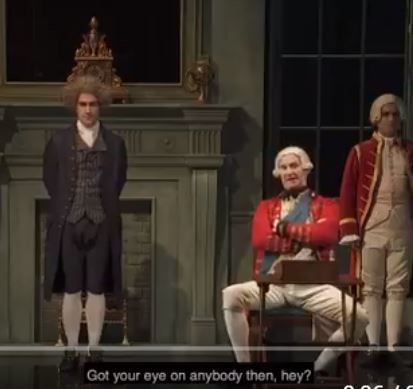
The use of Handel’s music in The Madness of King George prompted this train of thought: how music is understood and used at the time of its birth and later—the sociological use of pomp and circumstance. Handel wrote Coronation Hymns for George I, and there they remain as the standard programme for Coronation in the United Kingdom. Not even the Soccer League arrangement of Zadok The Priest does harm their value -or so I think. It will be on when Charles III or William V will be crowned.
Handel’s Messiah’s story is related to another king, George II. No-one still knows why he stood up when Hallelujah was played. Actually, he didn’t. He wasn’t even there. Many a convoluted and apocryphal story has been passed around from generation to generation. If he did this, at a possible private concert, why? To honour God? Did he come in late, and the audience rose to respect the king? To get to the lavatory? To rest his back and feet after long sitting? Hanovers were peculiar and prone to act on their whims – and after all, music had been on for 2 hours by then. The first performance of Messiah was a charity one in Dublin, in the outer region of the Kingdom. It must have been a coup for The Duke of Devonshire to get Handel and Messiah there. Soon it was performed at London – at a secular place, Theatre Royal. There was some controversy, for using sacred texts for theatrical music conventions, and performing at a secular place. Sacred Oratorio was a strange new concept, and English text too (instead of Italian or Latin).
There is the intriguing aspect of giving the Word of God in a popular music form “to the people”. The translations of The Bible started to spread after Reformation – but the original intent was not to replace The Church and the clergy for personal piety and solitary devotion. With the growing literacy, nonconformism was born in the 17th century and individual beliefs (reading the Bible by yourself) were reinforced, with the help of lEnlightenment and Romanticism. I once heard about a New York Catholic Diocese effort of replacing old liturgies with the American musical conventions. It didn’t succeed, I guess. Was hearing “Rejoice Greatly” an experience leading - eventually - to soul music, hymns modern and gospel? At the time when the Bible texts still were in the hands of elite ( = literacy, education) , music was a powerful way to give the Bible of The Church to the people – how it changed the liturgy, that is another story.
There is Professor Matti Klinge in Finland who puts great weight on the difference of America (Calvinist, bad) and Europe (Catholic, good), but it is not that simple. Europe is not a pure “cultured” Catholic heaven, and the striving individualism in Protestant movements (not only Calvinist) is an elemental force in education, empowerment, enlightenment and the sociological big drive for equality. Unfortunately, this drive for liberty and civil rights, based on Bible, is a mixed bag. It has given us freedom, but it has given us a lot of frivolity, soap opera and unsteady politics, too. Probably fundamentalist Christianity, as well - what about Alt-Right?
I loved the Nottingham Playhouse performance of The Madness of King George. First time I saw Mark Gatiss on stage (as not on TV) , he was powerful. The curtain calls made use of Handel’s Firework Music effectively - to promote the unity of the King and country the crew took bows by the rhythm of music. As the entire piece deals with an individual King as a man and the Body of Nation (the king) - very appropriate.
P:S: HERE IS an interesting promotion video where Mark Gatiss studies George III letters https://www.youtube.com/watch?v=3l7NFyq_aGo
Kommentit
Tämän blogin kommentit tarkistetaan ennen julkaisua.